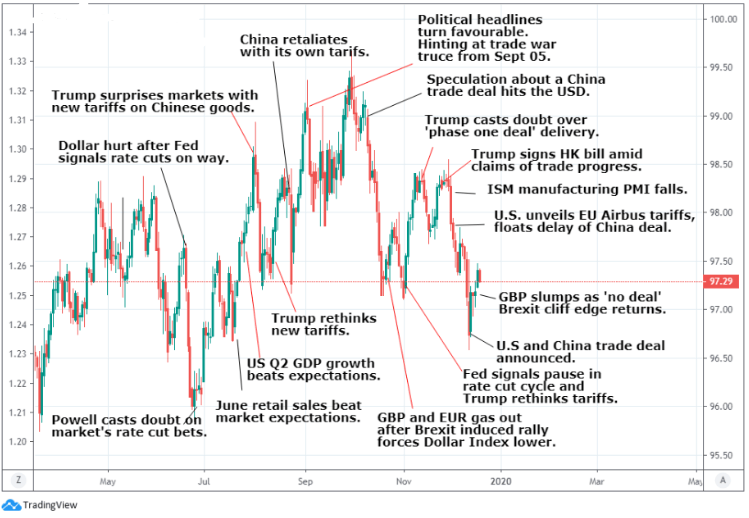How the Political Landscape of 2019 affected Forex Investors
 Forex is a combination of foreign currency and exchange. Foreign exchange is the process of changing one currency into another currency mainly for commerce, trading, or tourism. Due to these three reasons this market has a worldwide reach and is considered as one of the most liquid asset markets in the world. The average trading volume last year was more than $5.1 trillion in daily forex trading volume. The values of individual currencies vary, which has given rise to the need for foreign exchange services and trading.
Forex is a combination of foreign currency and exchange. Foreign exchange is the process of changing one currency into another currency mainly for commerce, trading, or tourism. Due to these three reasons this market has a worldwide reach and is considered as one of the most liquid asset markets in the world. The average trading volume last year was more than $5.1 trillion in daily forex trading volume. The values of individual currencies vary, which has given rise to the need for foreign exchange services and trading.
Unlike stock markets, where we can trace their roots back centuries, forex is a truly new market. Of course, in its most basic sense—forex has been around since nations began minting currencies. However, the modern forex market is a modern invention. After the accord at Bretton Woods in 1971, more major currencies were allowed to float freely against one another. The Bretton Woods Agreement was negotiated in July 1944 to establish a new international monetary system known as the Bretton Woods System. The Agreement was developed by delegates from 44 countries at the United Nations Monetary and Financial Conference held in Bretton Woods, New Hampshire.
Forex market fluctuations depend on a number of factors. One major factor is the political scenario. The political landscape of a nation plays a major role in the economic outlook for the country which will consequently effect the value of its currency. Forex traders are constantly monitoring political news and events to gauge what actions policy makers may take. For investors to understand better, this article will mention some examples which had an impact on forex trading in 2019. These can include measures from increasing government spending to tightening restrictions on a particular sector or industry.
An upcoming election is always a major event for currency markets. Exchange rates will often react more favourably to parties with fiscally responsible platforms and governments willing to pursue economic growth. A good example is the Brexit vote, which had a major impact on the British Pound when the UK voted to leave the EU. The election result depreciated the sterling currency reaching its lowest levels since 1985 since this led to the UK’s economic prospects being highly uncertain.
For most investors this outcome was seen as a positive which in fact was seen in the performance of the FTSE 100 and FTSE 250. Another uplift was recorded when the Conservative party won the election. The Pound gained 2% against the US Dollar. Currency strategists are expecting the surge to be contained as the UK enters the new and equally challenging phase of negotiating its future trading relationship with the bloc before the end of 2020. Expectations are that the country’s economic fundamentals could work in parallel with the trade discussions hence increasing the demand for the pound in the New Year.
Sterling was higher ahead of the December interest rate decision of the Bank of England. However, in my opinion the value of the sterling pound will then be contingent on progress in the UK’s trade talks with the EU and other trading partners. This may temporarily lead to the currency being reattached to traditional economic data rather than Brexit headlines in the media.
The fiscal and monetary policies of any government are the most important factors in its economic decision making. Central bank decisions that impact interest rates are keenly watched by the forex market for any changes in key rates or future outlooks. This can be clearly illustrated in December 2019.
Another altercation that weakened the dollar was when President Donald Trump was impeached for alleged abuse of power and obstruction of congress by the Democratic Party. However, analysts stated that this scenario had little effect on the dollar strength and sustained the fact that Trump’s economic policies have lifted the dollar. Moving closer to this year’s US presidential elections, various analysts are predicting that the Forex market will become more sensitive to the US political development.
Theoretically, monetary policy is how a Central Bank influences demand and supply of money. Hence, when the Fed decided to cut rates the value of dollar decreased. The value of the dollar also declined when Trump introduced new tariffs to be imposed on imports from China. Perception and uncertainty are also two factors that have a toll on the currency value. When there was doubt that the US and China were not going to finalise phase one of the trade deal, the dollar fell by around 2%.
Last year brought about a number of scenarios that had an impact on two major currencies, the Dollar and the Sterling. In a nutshell and for ease of reference, the below is an illustration of the Dollar/Sterling rate, until December 2019. As one can appreciate, it was quite a roller coaster ride for Forex investors.

Investors who hold foreign investments should keep in mind that a change in the value of a currency pair may have an impact on the value of their investments. Investors who want to reduce currency risk should opt for hedged strategies. Alternatively, investors can take currency risk if they are bullish on a particular currency. All in all, investors should consult their financial advisor in order to consider which strategy suits them best within their risk tolerance, needs and objectives.
Matthew Miceli Donnelly, ICIWM, B.Com Banking & Finance & Management (Melit.), B.Com (Hons.) Management, MBA (Melit.), is an Investment Advisor at Jesmond Mizzi Financial Advisors Limited. This article does not intend to give investment advice and the contents therein should not be construed as such. The Company is licensed to conduct investment services by the MFSA and is a Member of the Malta Stock Exchange and a member of the Atlas Group. The directors or related parties, including the company, and their clients are likely to have an interest in securities mentioned in this article. Investors should remember that past performance is no guide to future performance and that the value of investments may go down as well as up. For further information contact Jesmond Mizzi Financial Advisors Limited of 67, Level 3, South Street, Valletta, on Tel: 2122 4410, or email [email protected]
